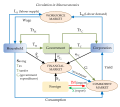Money supply (redirect from Monetary aggregate)
classified along a spectrum or continuum between narrow and broad monetary aggregates. Narrow measures include only the most liquid assets: those most...
48 KB (5,428 words) - 16:46, 12 December 2024
banking, the Divisia monetary aggregates index is an index of money supply. It uses Divisia index methods. The monetary aggregates used by most central...
8 KB (1,099 words) - 21:53, 15 December 2024
Monetary policy is the policy adopted by the monetary authority of a nation to affect monetary and other financial conditions to accomplish broader objectives...
80 KB (9,704 words) - 17:47, 20 December 2024
AD–AS model (redirect from Aggregate Demand-Aggregate Supply model)
The AD–AS or aggregate demand–aggregate supply model (also known as the aggregate supply–aggregate demand or AS–AD model) is a widely used macroeconomic...
22 KB (2,849 words) - 16:48, 2 September 2024
Fiscal policy (section Monetary or fiscal policy?)
taxation and government spending influence aggregate demand and the level of economic activity. Fiscal and monetary policy are the key strategies used by a...
20 KB (2,553 words) - 09:23, 21 December 2024
influence the aggregate demand, interest rates, and amounts of money and credit to affect overall economic performance. The traditional monetary transmission...
6 KB (711 words) - 21:50, 15 December 2024
Aggregate data is high-level data which is acquired by combining individual-level data. For instance, the output of an industry is an aggregate of the...
22 KB (2,655 words) - 22:04, 8 April 2024
that monetary inflation and price inflation are distinct, and that when there is idle capacity, monetary inflation can cause a boost in aggregate demand...
8 KB (1,019 words) - 23:25, 19 December 2024
Macroeconomics (section Monetary policy)
business cycle fluctuations and changes in aggregate demand which often drive them. Stabilization policies like monetary policy or fiscal policy are relevant...
57 KB (6,821 words) - 18:10, 25 November 2024
response to this shift affects households' disposable income. Second, aggregate monetary shocks are not distributional neutral since they affect the return...
49 KB (6,199 words) - 02:42, 10 December 2024
The Bloomberg US Aggregate Bond Index, or the Agg, is a broad base, market capitalization-weighted bond market index representing intermediate term investment...
8 KB (872 words) - 18:52, 12 September 2024
Monetarism (redirect from Monetary rule)
using theoretically-grounded Divisia monetary aggregates, which weight monetary components based on their "monetary services" or liquidity properties, have...
26 KB (2,977 words) - 01:04, 22 December 2024
decision-making. In the past, the BSP followed the monetary aggregate targeting approach to monetary policy. This approach is based on the assumption that...
17 KB (2,126 words) - 01:33, 17 August 2024
shows the importance of various demand shocks (including the effects of monetary policy and fiscal policy) on output and consequently offers an explanation...
29 KB (3,737 words) - 19:12, 30 November 2024
Economic Research. pp. 45–117. ISBN 0-87014-097-3. Retrieved 8 February 2011. Aggregate Reserves Of Depository Institutions And The Monetary Base (H.3)...
7 KB (867 words) - 00:29, 13 November 2024
of aggregate demand in an open economy, which include variables such as the real exchange rate as well as the real interest rate. Moreover, monetary policy...
5 KB (727 words) - 10:37, 30 October 2024
The Hong Kong Monetary Authority (HKMA) is the central banking institution of Hong Kong. It is a government authority founded on 1 April 1993 when the...
18 KB (1,521 words) - 05:23, 17 October 2024
In economics, aggregate demand (AD) or domestic final demand (DFD) is the total demand for final goods and services in an economy at a given time. It...
21 KB (2,867 words) - 21:29, 2 October 2024
distinguish valid nominal and real monetary relationships for micro or macro uses, including their influence on the aggregate demand for output. Its methods...
114 KB (8,861 words) - 05:32, 22 December 2024
Inflation (category Macroeconomic aggregates)
Consequently, monetarists contended that monetary policy, not fiscal policy, was the most potent instrument to influence aggregate demand, real output and eventually...
122 KB (14,049 words) - 15:33, 21 December 2024
In economics, aggregate supply (AS) or domestic final supply (DFS) is the total supply of goods and services that firms in a national economy plan on...
14 KB (1,609 words) - 20:12, 1 June 2024
Money multiplier (category Monetary policy)
In monetary economics, the money multiplier is the ratio of the money supply to the monetary base (i.e. central bank money). If the money multiplier is...
36 KB (4,324 words) - 00:05, 22 July 2024
Demand-pull inflation occurs when aggregate demand in an economy is more than aggregate supply. It involves inflation rising as real gross domestic product...
4 KB (477 words) - 10:06, 12 November 2024
Modern monetary theory or modern money theory (MMT) is a heterodox macroeconomic theory that describes currency as a public monopoly and unemployment as...
64 KB (6,976 words) - 00:21, 7 December 2024
background for the Committee's monetary policy decisions, The economy's aggregate money supply is the total of M0 money, or monetary base - "dollars" in currency...
79 KB (9,093 words) - 20:34, 18 September 2024
Lucas aggregate supply function or Lucas "surprise" supply function, based on the Lucas imperfect information model, is a representation of aggregate supply...
8 KB (983 words) - 21:06, 11 June 2021
Keynesian economics (section Monetary remedies)
models of how aggregate demand (total spending in the economy) strongly influences economic output and inflation. In the Keynesian view, aggregate demand does...
107 KB (13,226 words) - 05:05, 17 December 2024
by distinguishing factors that affect aggregate demand from those that affect aggregate supply. While monetary and fiscal policy can be used to stabilise...
43 KB (5,101 words) - 23:14, 17 December 2024
Central bank (redirect from Monetary authority)
bank, national bank, or monetary authority is an institution that manages the currency and monetary policy of a country or monetary union. In contrast to...
95 KB (9,845 words) - 04:00, 17 November 2024












